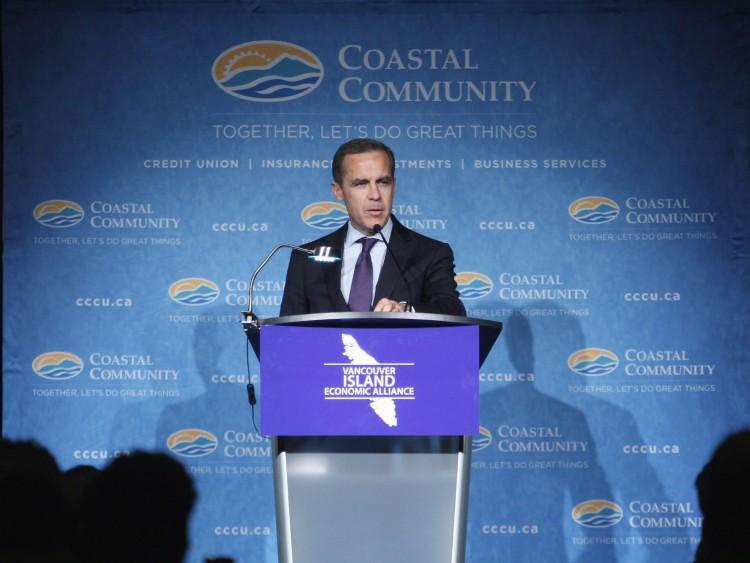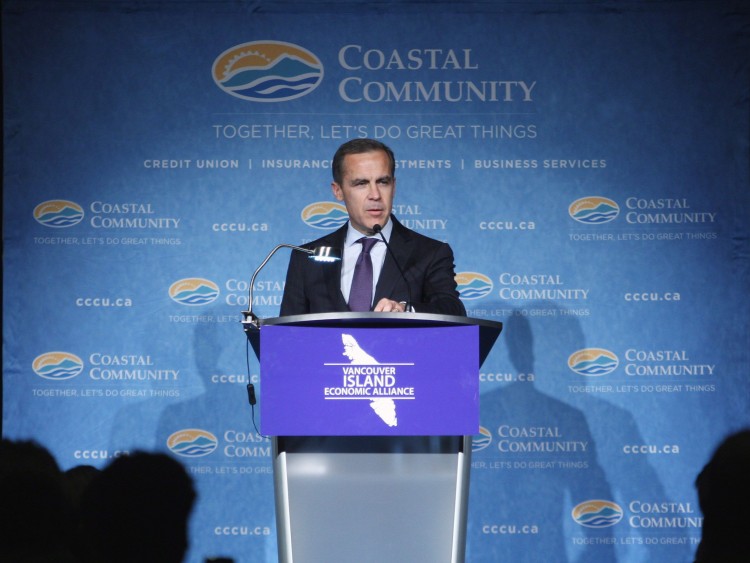TORONTO—Bank of Canada Governor Mark Carney noted the grim state of the international economy in a familiar refrain handed out Monday to the Vancouver Island Economic Alliance.
Speaking in Nanaimo, B.C., Carney outlined a situation that is cause for angst with little prospect of immediate improvement.
The “Great Recession” is over, he noted, but now companies and governments are left to dig themselves out of debt, a process of deleveraging that is holding back the global economic recovery.
The eurozone stagnates as the U.S. teeters at the edge of a fiscal cliff, noted Carney. And in the last International Monetary Fund (IMF) growth forecast, no region or major economy offered a bright spot to point to.
“Against this background, it is not surprising that uncertainty over the global economic outlook is high. It is being reinforced by concerns over how policymakers will address these challenges. This combined uncertainty is further complicating the recovery, prompting firms and consumers to retrench,” Carney said.
“It is only human to respond to uncertainty with caution. Faced with a highly volatile environment, households shy away from spending on big-ticket items such as houses or cars, and firms put off making large capital investments and hiring new workers.”
Low interest rates from central banks may be keeping financial markets flowing, but economic fundamentals have yet to improve and provide a lasting solution.
Carney said major players are holding on to their cash and that lack of investment could be a major factor in the current status quo.
“This apparent lack of conviction in markets can itself be considered a sign of unusual levels of uncertainty,” he said.
Carney said uncertainty causes slower growth, while slower growth also contributes to uncertainty.
“The current combination of economic weakness and heightened uncertainty may be forming a vicious circle in the global economy,” he said.
Carney added that the slowdown in China reflects weaker European demand and “large vulnerabilities building in the housing sector, increasing evidence of overinvestment”—or what others have called China’s real estate bubble.
But despite the grim situation, the Great Recession was not on the scale of the Great Depression, though there are lessons to be learned from the economic calamity of 80 years ago, noted Carney.
“Franklin D. Roosevelt famously told Americans that ’the only thing we have to fear is fear itself.' But this is not the Great Depression. The IMF expects the global economy to grow by more than 3 percent this year and next, or just under the average of the past 10 years. What we face now is better described as uncertainty rather than fear.”
And yet, FDR’s comments stand, said Carney, and fear should not preclude action, or scare people from profitable opportunities that will slip away. That would compound the real but manageable challenges facing the global economy, he said.
Rather, now is the time to be “quick and bold,” said Carney, taking example from the central banks in the U.S., U.K., and euro area.
And while Canada cannot control the euro or fix the American housing market, Carney suggested that it can improve its productivity and target emerging economies.
“And we can continue to invest in our greatest resource—our people,” he added.
Carney said the Monetary Policy Report due next week will give the bank’s outlook for the country, factoring in the uncertainty facing the world. He pledged that the Bank of Canada would do whatever it needed to keep its two percent inflation target.
“That certainty is our contribution to ensuring that Canadians can invest and plan with confidence.”
The Epoch Times publishes in 35 countries and in 19 languages. Subscribe to our e-newsletter.






